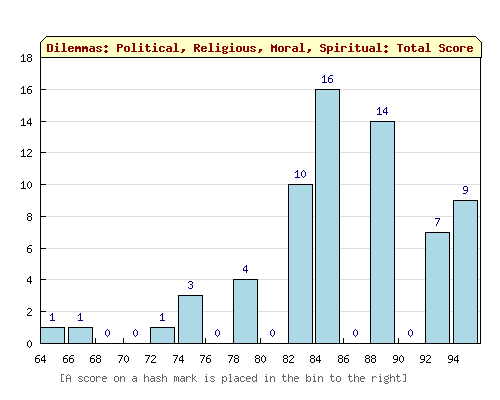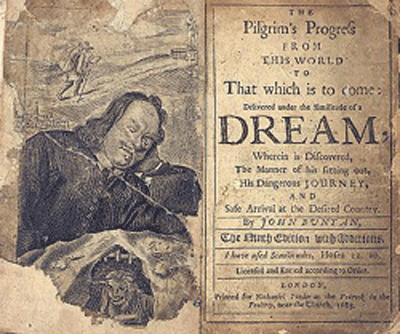Midterm Page

Statistics
| Mean: | 85.65 |
|---|---|
| Median: | 85.00 |
| Mode: | 85.00 |
| Maximum: | 95.00 |
| Minimum: | 65.00 |
| Std. deviation: | 6.55 |
| # scores: | 66 |
Material for the Midterm Exam
“No surprises/No choices”
Exam date: Tuesday, 5/5 (for 50 minutes)
The material for the midterm exam follows.
PART I. (25 minutes) DIRECTIONS: The directions you will see on the exam are as follows:
Briefly "situate" the following 2 quotations (identify author and work and explain what's happening). Then discuss the quoted material you have chosen, dealing specifically with details.
1. "Though the consciences of such men are awakened, yet their minds are not changed: therefore when the power of guilt weareth away, that which provoked them to be religious ceaseth. Wherefore they naturally turn to their own course again: even as we see the dog that is sick of what he hath eaten, so long as his sickness prevails, he vomits and casts up all; not that he doth this of a free mind (if we may say a dog has a mind) but because it troubleth his stomach; but now when his sickness is over, and so his stomach eased, his desires being not at all alienate from his vomit, he turns him about, and licks up all. And so it is true which is written, The dog is turned to his own vomit again. Thus, I say, being hot for heaven, by virtue only of the sense and fear of the torments of Hell, as their sense of hell, and the fears of damnation chills and cools, so their desires for Heaven and salvation cool also."
2.
"For his long absence Church and State did groan;
Madness the pulpit, Faction seiz'd the Throne.
Exprience'd Age in deep despair was lost!
To see the Rebel thrive, the Loyal crost:
Youth that with Joys had unacquainted been
Envy'd gray hairs that once good days had seen:
We thought our Sires, not with their own content,
Had ere we came to age our portion spent."
3. "So that in the first place, I put for a general inclination of all mankind, a perpetuall and restlesse desire of Power after power, that ceaseth only in death. And the cause of this, is not always that a man hopes for a more intensive delight, than he has already attained to; or that he cannot be content with a moderate power; but because he cannot assure the power and means to live well, which he hath present without the acquisition of more."
4. "Though in a constituted commonwealth, standing upon its own basis, and acting according to its own nature, that is, acting for the preservation of the community, there can be but one supreme power, which is the legislative, to which all the rest are and must be subordinate, yet the legislative being only a fiduciary power to act for certain ends, there remains still in the people a supreme power to remove or alter the legislative, when they find the legislative act contrary to the trust reposed in them: for all power given with trust for the attaining an end, being limited by that end, whenever that end is manifestly neglected, or opposed, the trust must necessarily be forfeited, and the power devolve into the hands of those that gave it, who may place it anew where they shall think best for their safety and security. And thus the community perpetually retains a supreme power of saving themselves from the attempts and designs of any body, even of their legislators, whenever they shall be so foolish, or so wicked, as to lay and carry on designs against the liberties and properties of the subject."
5. "First, The pilgrims were clothed with such kind of Raiment, as was diverse from the Raiment of any that traded in that fair. The people, therefore, of the fair, made a great gazing upon them: Some said they were Fools, some they were Bedlams, and some they are Outlandish-men.
Secondly, And as they wondred at their Apparel, so they did likewise at their Speech; for few could understand what they said; they naturally spoke the Language of Canaan; But they that kept the fair, were the men of this World; So that, from one end of the fair to the other, they seemed Barbarians each to the other."
6. First, because the care of souls is not committed to the civil magistrate, any more than to other men. It is not committed unto him, I say, by God; because it appears not that God has ever given any such authority to one man over another as to compel anyone to his religion. Nor can any such power be vested in the magistrate by the consent of the people, because no man can so far abandon the care of his own salvation as blindly to leave to the choice of any other, whether prince or subject, to prescribe to him what faith or worship he shall embrace. For no man can, if he would, conform his faith to the dictates of another. All the life and power of true religion consist in the inward and full persuasion of the mind; and faith is not faith without believing. Whatever profession we make, to whatever outward worship we conform, if we are not fully satisfied in our own mind that the one is true and the other well pleasing unto God, such profession and such practice, far from being any furtherance, are indeed great obstacles to our salvation."
7.
8. "Though the earth and all inferior creatures be common to all men, yet every man has a property in his own person; this nobody has any right to but himself. The labour of his body and the work of his hands we may say are properly his. Whatsoever, then, he removes out of the state that nature hath provided and left it in, he hath mixed his labour with it, and joined to it something that is his own, and thereby makes it his property. It being by him removed from the common state nature placed it in, it hath by this labour something annexed to it that excludes the common right of other men. For this labour being the unquestionable property of the labourer, no man but he can have a right to what that is once joined to, at least where there is enough and as good left in common for others."
9. Secondly, Because the Right of bearing the Person of them all is given to him they make Sovereign, by Covenant only of one to another, and not of him to any of them, there can happen no breach of Covenant on the part of the Sovereign; and consequently none of his Subjects, by any pretence of forfeiture, can be freed from his Subjection. That he which is made Sovereign maketh no Covenant with his Subjects before-hand is manifest; because either he must make it with the whole multitude, as one party to the Covenant, or he must make a several Covenant with every man. With the whole, as one party, it is impossible, because as they are not one Person: and if he make so many several Covenants as there be men, those Covenants after he hath the Sovereignty are voyd; because what act soever can be pretended by any one of them for breach thereof is the act both of himself, and of all the rest, because done in the Person, and by the Right of every one of them in particular. Besides, if any one, or more of them, pretend a breach of the Covenant made by the Sovereign at his Institution; and others, or one other, of his Subjects, or himselfe alone, pretend there was no such breach, there is in this case no Judge to decide the controversy: it returns therefore to the Sword again; and every man recovereth the right of Protecting himselfe by his own strength, contrary to the design they had in the Institution. It is therefore in vain to grant Sovereignty by way of precedent Covenant. The opinion that any Monarch receiveth his Power by Covenant, that is to say, on Condition, proceedeth from want of understanding this easie truth, that Covenants being but words, and breath, have no force to oblige, contain, constrain, or protect any man, but what it has from the public Sword; that is, from the untyed hands of that Man, or Assembly of men that hath the Sovereignty, and whose actions are avouched by them all, and performed by the strength of them all, in him united.
10.
-------------------------------------------------------------------------------------------------------------------------------------
PART II. DIRECTIONS (25 minutes). The directions on the exam will be as follows:
Write an essay in response to the following question/prompt. Refer to specific details to support what you have to say.
A. Dissent: Religious dissent was an important political problem. Compare what our authors (Hobbes, Dryden, Bunyan, & Locke) say or imply about it.
B. Compare Hobbes's and Locke's uses of the idea of contract (or compact) and consider whether any such idea exists in Bunyan. Explain.
C. With the idea of "representation," Hobbes finds a way to relieve nature's intolerable equality by turning the ever-restless "multitude" into one will, one voice. Describe the problem and explain why representation is a solution to it. Then compare the problem Bunyan addresses and his solution to it, emphasizing any similarities you see between Hobbes and Bunyan.

